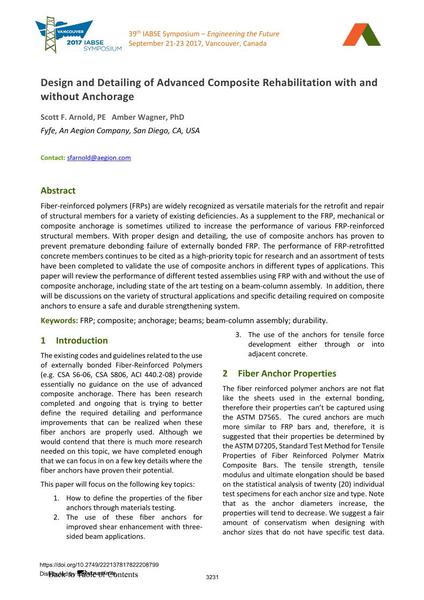Design and Detailing of Advanced Composite Rehabilitation with and without Anchorage

|
|
|||||||||||
Bibliografische Angaben
| Autor(en): |
Scott F. Arnold
(Fyfe, An Aegion Company, San Diego, CA, USA)
Amber Wagner (Fyfe, An Aegion Company, San Diego, CA, USA) |
||||
|---|---|---|---|---|---|
| Medium: | Tagungsbeitrag | ||||
| Sprache(n): | Englisch | ||||
| Tagung: | IABSE Symposium: Engineering the Future, Vancouver, Canada, 21-23 September 2017 | ||||
| Veröffentlicht in: | IABSE Symposium Vancouver 2017 | ||||
|
|||||
| Seite(n): | 3231-3236 | ||||
| Anzahl der Seiten (im PDF): | 6 | ||||
| Jahr: | 2017 | ||||
| DOI: | 10.2749/222137817822208799 | ||||
| Abstrakt: |
Fiber-reinforced polymers (FRPs) are widely recognized as versatile materials for the retrofit and repair of structural members for a variety of existing deficiencies. As a supplement to the FRP, mechanical or composite anchorage is sometimes utilized to increase the performance of various FRP-reinforced structural members. With proper design and detailing, the use of composite anchors has proven to prevent premature debonding failure of externally bonded FRP. The performance of FRP-retrofitted concrete members continues to be cited as a high-priority topic for research and an assortment of tests have been completed to validate the use of composite anchors in different types of applications. This paper will review the performance of different tested assemblies using FRP with and without the use of composite anchorage, including state of the art testing on a beam-column assembly. In addition, there will be discussions on the variety of structural applications and specific detailing required on composite anchors to ensure a safe and durable strengthening system. |
||||
| Stichwörter: |
Dauerhaftigkeit Verbund CFK Ankerblock Balken
|
||||
